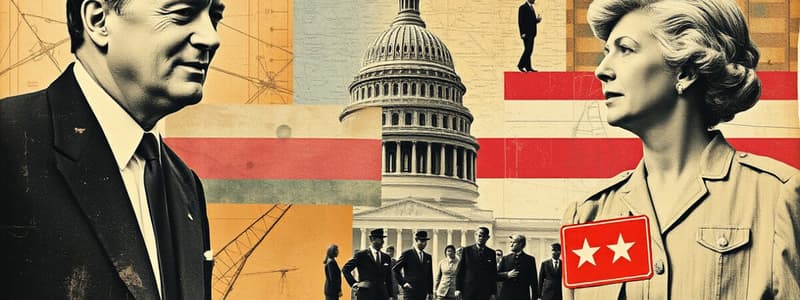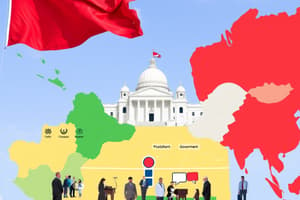Podcast
Questions and Answers
What term describes goods that all people may use but are of limited supply?
What term describes goods that all people may use but are of limited supply?
- Private goods
- Toll goods
- Common goods (correct)
- Public goods
Which form of government allows citizens to participate directly in decision-making?
Which form of government allows citizens to participate directly in decision-making?
- Representative democracy
- Oligarchy
- Monarchy
- Direct democracy (correct)
What is a key characteristic of elite theory?
What is a key characteristic of elite theory?
- Power is held equally by different social classes
- Political power is distributed among all citizens
- Political power rests in the hands of a small, elite group (correct)
- Government decisions are made based on majority rule
Which principle ensures that the majority has the authority to make binding decisions?
Which principle ensures that the majority has the authority to make binding decisions?
What does the term social capital refer to?
What does the term social capital refer to?
Which system of government is characterized by an all-powerful government with no rights for citizens?
Which system of government is characterized by an all-powerful government with no rights for citizens?
What type of preferences are characterized by strong feelings and a long-term commitment to an issue?
What type of preferences are characterized by strong feelings and a long-term commitment to an issue?
In which form of government do voters elect representatives to make decisions on their behalf?
In which form of government do voters elect representatives to make decisions on their behalf?
Which of the following describes a government where a small elite group holds political power?
Which of the following describes a government where a small elite group holds political power?
Majority rule allows the minority to have significant influence over government decisions.
Majority rule allows the minority to have significant influence over government decisions.
What term is used to describe goods provided by government that anyone can use without charge?
What term is used to describe goods provided by government that anyone can use without charge?
In a ________, voters select representatives to make decisions on their behalf.
In a ________, voters select representatives to make decisions on their behalf.
Match the terms with their definitions:
Match the terms with their definitions:
Which of the following best describes social capital?
Which of the following best describes social capital?
Direct democracy involves electing representatives to make laws on behalf of the people.
Direct democracy involves electing representatives to make laws on behalf of the people.
What is the significance of minority rights in a democratic system?
What is the significance of minority rights in a democratic system?
Flashcards are hidden until you start studying
Study Notes
Common Goods and Types of Goods
- Common goods are accessible to all individuals, but their availability is limited.
- Private goods are offered by businesses, restricting usage to those who pay for them.
- Public goods are provided by the government, ensuring availability to everyone at no cost.
- Toll goods are accessible to many, but usage is contingent upon payment.
Government and Political Systems
- Government organizes society and allocates authority to achieve collective objectives.
- Democracy empowers people with political power, advocating for majority rule.
- Direct democracy allows citizens to participate directly in decision-making without elected representatives.
- Representative democracy involves electing officials to create and enact laws on behalf of the populace.
Theories of Power
- Elite theory posits that a small, elite group holds political power.
- Oligarchy describes a system where a few elite members of society share authority.
- Pluralist theory suggests that political power is distributed among various groups of people.
Political Ideologies and Preferences
- Ideology encompasses the beliefs that shape political opinions and influence policy.
- Intense preferences are strong, enduring beliefs held over time, while latent preferences are less committed and subject to change.
Political Rights and Principles
- Majority rule is a core democratic principle, asserting that decisions should reflect the majority's choice.
- Minority rights ensure protections for individuals or groups not in the majority, safeguarding against potential oppression.
Partisanship and Social Capital
- Partisanship entails strong loyalty to a specific political party, which can lead to unwavering support.
- Social capital refers to the relationships and networks individuals have, fostering community engagement and cooperation.
Totalitarianism
- Totalitarianism is characterized by an all-powerful government, leaving citizens with no rights or personal freedoms.
Governance Concepts
- Common goods are resources accessible to all but are limited in supply, requiring careful management.
- Democracy empowers citizens, allowing political power to rest in the hands of the population.
- Direct democracy enables individuals to participate personally in decision-making rather than through elected officials.
- Elite theory posits that a select group possesses the majority of political power, overshadowing broader participation.
Government Functions and Structures
- Government organizes societal structure and allocates authority to achieve collective goals.
- Monarchy entails governance led by a single ruler, often inherited, who holds significant political authority.
- Oligarchy refers to a regime where a small group of elite individuals holds control over political decisions.
Political Dimensions
- Ideology encompasses the beliefs that shape political perspectives and influence policy-making.
- Politics involves decision-making related to resource allocation and policy direction.
- Partisanship indicates strong loyalty to a political party, which may lead to biased support.
Preferences and Rights
- Intense preferences are deeply felt beliefs that individuals maintain over time regarding specific issues.
- Latent preferences are less fixed and may shift over time, reflecting changing opinions.
- Majority rule is a foundational democratic principle, ensuring that the decisions of the majority are binding for everyone.
- Minority rights safeguard those not in the majority, ensuring protection and representation.
Goods Classification
- Private goods are offered by businesses and restrict usage to those who can afford to pay.
- Public goods are government-provided resources available to all citizens at no cost.
- Toll goods are accessible to many but utilized only by those willing to pay the necessary price.
Social Dynamics
- Social capital refers to the value of social networks and relationships, promoting community engagement and support.
- Representative democracy allows voters to elect officials to legislate and govern on their behalf, rather than direct voting on every issue.
Extreme Government Forms
- Totalitarianism defines a system where the government exerts total control, and individual rights are severely restricted.
Studying That Suits You
Use AI to generate personalized quizzes and flashcards to suit your learning preferences.




